Nietzsches Final Teaching
MICHAEL ALLEN GILLESPIE
The University of Chicago Press Chicago and London
The University of Chicago Press, Chicago 60637
The University of Chicago Press, Ltd., London
2017 by The University of Chicago
All rights reserved. No part of this book may be used or reproduced in any manner whatsoever without written permission, except in the case of brief quotations in critical articles and reviews. For more information, contact the University of Chicago Press, 1427 E. 60th St., Chicago, IL 60637.
Published 2017
Printed in the United States of America
26 25 24 23 22 21 20 19 18 17 1 2 3 4 5
ISBN-13: 978-0-226-47688-9 (cloth)
ISBN-13: 978-0-226-47691-9 (e-book)
DOI: 10.7208/chicago/9780226476919.001.0001
Library of Congress Cataloging-in-Publication Data
Names: Gillespie, Michael Allen, author.
Title: Nietzsches final teaching / Michael Allen Gillespie.
Description: Chicago ; London : The University of Chicago Press, 2017. | Includes bibliographical references and index.
Identifiers: LCCN 2016049886 | ISBN 9780226476889 (cloth : alk. paper) | ISBN 9780226476919 (e-book)
Subjects: LCSH: Nietzsche, Friedrich Wilhelm, 18441900. | Nihilism.
Classification: LCC B3317 .G5155 2017 | DDC 193dc23 LC record available at https://lccn.loc.gov/2016049886
 This paper meets the requirements of ANSI/NISO Z39.481992 (Permanence of Paper).
This paper meets the requirements of ANSI/NISO Z39.481992 (Permanence of Paper).
CONTENTS
I first encountered the work of Friedrich Nietzsche as a first-year college student. The excitement and enthusiasm that that experience engendered is hard to describe or recapture, but it was real and compelling. Nietzsche speaks to the reader with an intimacy that is unusual among authors and unique among philosophers. When first reading Nietzsche, one feels as if one is being invited into a secret society, offered knowledge and insight available only to a select few, and allowed to experience feelings unknown to the rest of humanity. To read Nietzsche is to be suffused with a sense of soaring above the world and looking down on everything and everyone. To read Nietzsche especially when young is often simply to be carried away.
When so gloriously flying over humanity, however, it is difficult if not impossible to maintain any critical distance on oneself or on the author. I certainly had none in those faraway days. Such enthusiasm is not accidental. Nietzsches goal is not to persuade but to enthuse, entrance, and overpower the reader, to initiate him into sacred mysteries and impel him to action. For many he is hard to resist. Over time, however, the attentive reader experiences a nagging suspicion that he has missed something, that exhilaration cannot be all of the story, that Nietzsche demands something more. The suspicion arises, to paraphrase the subtitle of Zarathustra, that Nietzsche does indeed write for all and for none, and that if one is not suspicious and critical, if one does not read Nietzsche as good old classicists read their Horace, as he puts it in Ecce Homo, one will simply be taken in (KGW VI 3:303).performance that signifies nothing, or at least nothing real, or is there some fundamental teaching that he means to impart? And if so, what is it, and where does he want to take humanity? I wish that I could say that after forty-five years of effort I had final answers to these questions, but that would be an exaggeration.
Nietzsche tells us repeatedly that he thinks the forbidden and traverses entire lands of thinking that others do not dare to enter, and raises questions that others are unable to endure. I think that this is correct and explains in part his phenomenal impact. On the surface Nietzsches texts are filled with images and ideas that whirl about and are borne aloft by the flames of his passion, but underneath this spectacular bonfire, questions pile upon questions, relentlessly, burning red hot. Indeed, for one who has gained some distance on Nietzsche, Nietzsche himself becomes questionable, questionable in ways that admit of no unequivocal answers. He himself seems to be on fire.
The question of questions and of questioning is itself close to Nietzsches heart. At the beginning of Beyond Good and Evil, he asks, Who among us here is Oedipus? Who is the Sphinx? (KGW VI 2:10) The depth and importance of this question is hard to exaggerate. It is a question that in a sense goes to the heart of thinking and reveals its dangers. Oedipus, as he first appears on Sophocles stage, describes himself as the one whom all men call great, great not because of his physical prowess but because of his ability to solve riddles and answer questions. And yet what he himself does not realize is that he is the greatest of all riddles, the deepest of all questions. And when he stumbles on the question of his own identity, he is driven by his own hubris to seek an answer to it, fatefully and disastrously, destroyed in horrifying fashion by his own virtue. Nietzsche like Oedipus lived in questions, and he too happened upon the question of himself. Who was he? What was his role in life? What was his task or calling?
Many of us at one time or another face these questions. Nietzsche asked himself these questions over and over, as his repeated autobiographical efforts demonstrate. His restless movement from one field to another at university, his dissatisfaction with theology and his turn to classical philology, and then despite his early success, his turn to philosophy and cultural criticism; his enthusiasm for the Wagnerian project, and his subsequent critique of everything Wagnerian, his hopes for the future of Germany followed by his rejection of everything Germanall bespeak a restlessness in search of a goal, someone on a quest for he knows not what, constantly dissatisfied, constantly moving on, repeatedly leaving things undone. However, when all else had failed and his life had come to a crisis, physically near death, and intellectually isolated and forgotten, Nietzsche found what he came to believe was the answer to his questions, and from that point forward he was a man possessed, caught up in his fate as inescapably as Oedipus, and in many respects just as tragically and disastrously. In that moment he became convinced not only that he had a task that could give meaning to his life, but that this task was of world-historical importance, and that his role was equal to that of Socrates, Buddha, or Christ. In his view, and contrary to what many commentators today suggest, this task was not merely a task of thinking but also of doing, deeply practical and political. Nietzsches goal was not a professors goal or even a poets or philosophers goal. He did not intend merely to fence with ideas, even with the ideas of the greatest poets and philosophers. His task, he came to believe, was nothing less than the revaluation of all values, the complete transformation of European civilization.
Not only did he recognize his goal but also the means to attain it, and they were not pretty. He quickly came to see that to give birth to a new Europe, the old Europe had to be destroyed. Such a destruction in his view was in any case inevitable and indeed was already under way. His hope was that out of the wars he saw coming a hardened elite would arise who would hear and respond to his message giving birth to a group of superhuman creators. Only in this way could the decadence and degeneracy of the current nihilistic world be overcome.
Nietzsche was also well aware that the only means he had at his disposal were pen and paper. Fortunately or unfortunately depending on ones point of view, he had a capacity for using them that has seldom been equaled. With these tools alone, he sought to set in motion the development of an elite who would construct a new world on the rubble nihilism would leave in its wake. The pursuit of this goal was his sole and unrelenting task from 1881 until he slipped into madness in early 1889. It would not be too great an exaggeration to say that in this effort he expended all of his life force trying to fully articulate his teaching and foster the apocalyptic transformation it entailed.

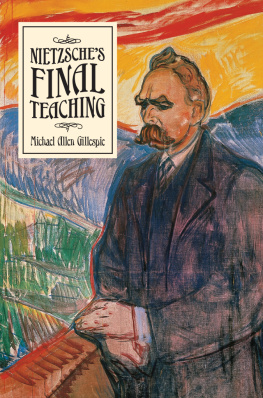
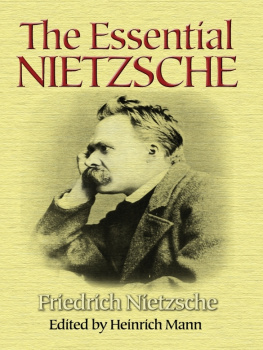
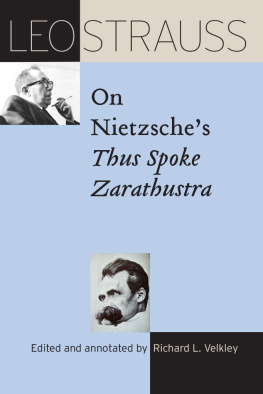


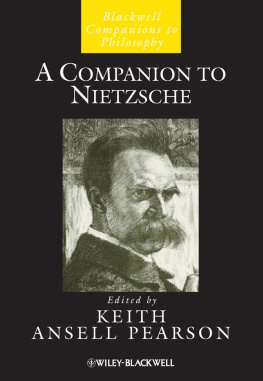

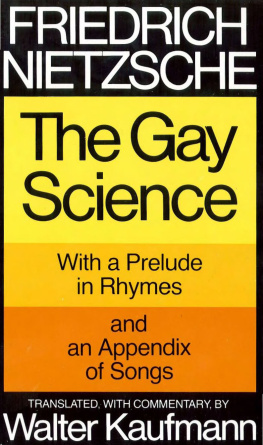
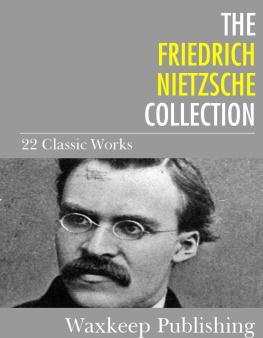



 This paper meets the requirements of ANSI/NISO Z39.481992 (Permanence of Paper).
This paper meets the requirements of ANSI/NISO Z39.481992 (Permanence of Paper).